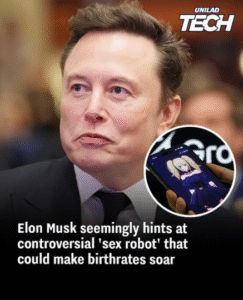Elon Musk has once again stirred widespread attention and debate after seemingly hinting at a controversial concept that blends advanced robotics, artificial intelligence, and human intimacy—a “sex robot” that, according to his remarks, could play a role in addressing declining global birthrates. Though Musk did not explicitly confirm such a project is in development, his recent comments, shared during an interview and amplified through social media, have sparked intense speculation about the future of human-robot relationships and the role of technology in reproduction.
The tech billionaire, known for his provocative ideas and boundary-pushing innovation, spoke broadly about the challenges humanity faces due to plummeting birthrates in several countries. “We are heading toward demographic collapse,” he said. “If people don’t start having more kids, civilization as we know it won’t survive.” Musk, who has long expressed concern about population decline, suggested that emerging technologies might offer “creative solutions” to reverse the trend.
What caught attention was his veiled reference to humanoid robots and their potential roles in companionship, intimacy, and even parenting assistance. “If robots can do physical labor and provide emotional support, it’s not far-fetched to imagine them filling roles that go beyond what we currently expect,” he said. While Musk didn’t use the term “sex robot” directly, his remarks were interpreted by many as an allusion to it, especially considering his recent promotion of Tesla’s humanoid robot, Optimus.
The Optimus robot, originally intended for manual labor and caregiving roles, has evolved rapidly, with Musk describing future models as “capable of empathy, interaction, and forming real bonds with humans.” He previously stated that future iterations could potentially serve as companions for the elderly, lonely individuals, or those seeking alternative forms of connection.
Critics and commentators quickly latched onto the implications. Some praised the idea as a potential answer to growing social isolation and changing attitudes toward relationships and reproduction. “This could change everything—from how we view intimacy to how societies sustain themselves,” one futurist said. Others, however, raised serious ethical and psychological concerns, warning that normalizing intimate relationships with machines could further alienate people from authentic human interaction.
Social media exploded with commentary. Memes, debates, and polarizing opinions dominated timelines. Some users joked about preordering the hypothetical robot, while others questioned the direction humanity is heading. A few drew parallels to dystopian science fiction, referencing films like Her, Ex Machina, or Blade Runner 2049, where AI-human relationships blur the line between love and simulation.
Religious leaders and ethicists voiced apprehension, warning that such developments could undermine traditional family values and relationships. “Technology should not replace human intimacy,” one pastor said. “There is something sacred about human connection that machines can never replicate.”
Experts in robotics and AI ethics chimed in as well, urging caution. While acknowledging the potential of humanoid robots to provide comfort and companionship, they warned that programming machines to simulate love or sexual desire raises complex moral questions. Can a robot truly consent? What happens if individuals become emotionally dependent on artificial partners? Could it worsen social detachment?
Still, some demographers and technologists see a strange logic in Musk’s hint. With birthrates dropping sharply in countries like Japan, South Korea, and much of Europe, and with many people expressing disinterest in traditional family life, unconventional solutions are being considered. Musk’s suggestion—though provocative—might reflect a future where technology supplements human reproduction through artificial wombs, robotic caregivers, and digital partners that mimic human emotions and desires.
In previous interviews, Musk has also floated the possibility of AI parenting systems or technological means of facilitating child-rearing without two biological parents. “We’re moving toward a time when humans might not need to form traditional nuclear families to raise children,” he noted.
The timing of his remarks comes as Tesla and other Musk-led companies push aggressively into robotics and AI. The Optimus project is reportedly undergoing testing for use in homes, hospitals, and industrial settings. With software modeled on neural networks similar to Tesla’s autonomous driving systems, the robot is becoming increasingly responsive to human behavior and voice commands.
Despite the controversy, Musk seemed unfazed by the public reaction. He later tweeted a cryptic emoji and a link to an article about global fertility rates dropping, without further elaboration. Fans viewed it as further confirmation that he believes drastic measures—however unconventional—may be necessary to avert demographic decline.
As with many of Musk’s provocations, it’s unclear whether this is serious groundwork for a future product or simply another speculative idea meant to challenge norms and spark conversation. But one thing is certain: the intersection of AI, robotics, and human intimacy is becoming more relevant by the day.
The suggestion of a sex robot that could “make birthrates soar” may seem far-fetched now, but it opens up larger discussions about how society adapts to technological disruption in areas as personal and fundamental as love, reproduction, and family. Whether humanity embraces or resists this vision remains to be seen, but Musk has, once again, forced the world to consider possibilities once thought to exist only in science fiction.


